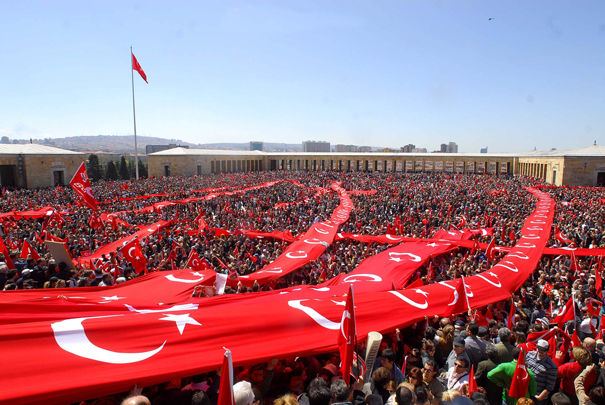
In early July, a muezzin chanted the Muslim call to prayer from Istanbul’s Hagia Sophia for the first time in 85 years. The building, once the largest Orthodox Christian church in the world, and then a mosque, was designated a museum by Kemal Ataturk in the 1930s, as part of his aggressive secularisation of the new Turkey.
The call to prayer enraged the Greek government, who described it as a provocation, but delighted Turkish Prime Minister Recep Tayyip Erdoğan religious followers. Erdoğan needed to give them something to support: there had been anger at his recent accommodation with Israel, normalising relations after the 2010 Mavi Marmara incident, when several Turkish activists were killed by Israeli troops boarding their ship, which was bound to break the blockade of Gaza.
This is Erdoğan’s Islamism: a tool deployed to position him and his AK party on the side of the masses, even while he is very clearly doing the work of the Establishment.
And this is how the post-coup landscape will play out: whatever happens, Erdoğan will portray it as the will of the people. Terrifyingly, the president has said the coup was a gift from God, giving him the chance to “cleanse” Turkey of its enemies. Thousands have been rounded up already. That the government appears to have a ready-made list of usual suspects to round up is not in the least surprising.
The incompetence of the coup, combined with the swiftness of retribution, have led some to believe the entire thing was orchestrated by the government. This seems unlikely: more realistically, the coup plotters knew their positions in the army were under threat, with upheaval due in August and mass reappointments, and felt now was their last chance to move against Erdoğan.
And what of the suggestion that the Gülen movement was responsible? The international movement, headed by Fethullah Gülen from his headquarters in Pennsylvania, was swift to distance itself from the coup. Gülen quickly issued a statement denouncing the coup in the “strongest possible terms”, adding: “As someone who suffered under multiple military coups during the past five decades, it is especially insulting to be accused of having any link to such an attempt. I categorically deny such accusations.”
It does seem unlikely that the putsch was instigated by Gülen, not least as it was apparently so unable to harness any support from his followers in the armed forces.
Nonetheless, Turkish politics has always had a deeply conspiratorial feel. The Gülenites are just the latest hidden power, cast in that role after the cleric fell out with Erdoğan. Before that, there was the Ergenoken, and always, the spectre of the “deep state”, the shadowy cabal that has been rumoured to run things behind the scenes for as long as anyone can remember.
It would be easy to cast the post-coup crackdown as an attack on the last vestiges of secularism in Turkey, as Patrick Cockburn has implied. Some US commentators such as Ben Shapiro have even suggested that a victory for the coup would have been preferable to what they cast as Erdoğan’s Hamasisation of Turkey.
But that is to miss the fact that the main fallout has been Erdoğan turning on the Gülenites, not the secularists.
It is also to imagine that all Islamist movements are the same. Erdoğan is religiously inspired, certainly, but he is first and foremost a streetfighter, less interested in ideological purity than in retention of power. Fears that Turkey will turn into a Middle Eastern theocracy are less well founded than fears it will become a central Asian strongman autocracy. Neither of these options are desirable, but they are distinct.